Ali Pasha
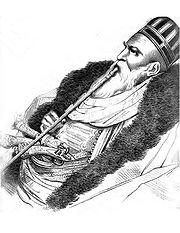
after Louis Dupré (1821)
Ali Pasha of Tepelena or of Yannina, surnamed Arslan, "the Lion", or the "Lion of Yannina", Ali Pasha Tepeleni, (1740 – January 24, 1822) was an Albanian ruler (pasha) of the western part of Rumelia, the Ottoman Empire's European territory which was also called Pashalik of Yanina. His court was in Ioannina. Ali had three sons: Ahmet Muhtar Pasha (served in the 1809 war against the Russians), Veli Pasha of Morea and Salih Pasha of Vallona [1]. Ali Pasha of Tepelena died on February 5, 1822 at the age of 80. Even though 80 years old man, Ali ranged a three years war against the unpopular Ottoman Sultan Mahmud II.
Contents |
Name
His name in the local languages was: Albanian: Ali Pashë Tepelena, Aromanian: Ali Pãshelu, Greek: Αλή Πασάς Τεπελενλής Ali Pasas Tepelenlis or Αλή Πασάς των Ιωαννίνων Ali Pasas ton Ioanninon (Ali Pasha of Ioannina) and Turkish: Tepedelenli Ali Paşa.
Early years
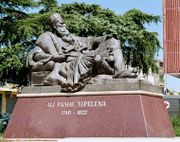
Ali was born into a powerful clan in the village Beçisht at the foot of the Këlcyrë mountains near the Albanian town of Tepelenë in 1740, He was one of the Toske tribes, and his ancestors had for some time held the hereditary office of bey of Tepeleni.[2]. His father Veli was bey (and possibly a retired Janissary). Many details about his life have been written by Haxhi Shekreti in his famous epic Alipashiad. About his origin, specific experts claim that he was born of a Turkish family from Anatolia,[3] but this is contested by various historians who claim that his family originates from modern southern Albania.[4]
Ali's father Veli Bey was murdered was killed when Ali was fourteen years old by rival neighboring chiefs who seized the territories of his Tosk tribe. The family lost much of its political and material status following the murder of his father in 1758 his mother, Hanko a woman of extraordinary character, thereupon herself formed and led a brigand band, and studied to inspire the boy with her own fierce and indomitable temper, with a view to revenge and the recovery of their lost wealth. According to Byron: "Ali inherited 6 dram and a musket after the death of his father...Ali collected a few followers from among the retainers of his father, made himself master, first of one village, then of another, amassed money, increased his power, and at last found himself at the head of a considerable body of Albanians".
Ali became a famous brigand leader and attracted the attention of the Turkish authorities. He was assigned to suppress brigandage and highway robbery and always in the field fought for the "Sultan and Empire" with great bravery, particularly against the famous rebel Paswan Oglou. He aided the pasha of Negroponte (Euboea) in putting down a rebellion at Shkodër, it was during this period that he was introduced to the Janissary units and was inspired by their discipline. In 1768 he married the daughter of the wealthy pasha of Delvina, with whom he entered an alliance.
His rise through Ottoman ranks continued with his appointment as lieutenant to the pasha of Rumelia. In 1787 he was awarded the pashaluk of Trikala in reward for his services at Banat during the Austro-Turkish War (1787–1791). In 1788 he seized control of Ioannina, and enlisted most of the Brigands under his own banner. Ioannina would be his power base for the next 33 years. He took advantage of a weak Ottoman government to expand his territory still further until he gained control of most of Albania, western Greece and the Peloponnese, governing with the help of trusted men like Hasan Dervishi, Meço Bono, Ago Myhyrdari, Thanasis Vagias, Veli Gega (murdered by Katsantonis), and Tahir Abazi[5]. Among many acclaimed personalities he was dubbed the "Mahometan Buonaparte".
Ali Pasha as ruler
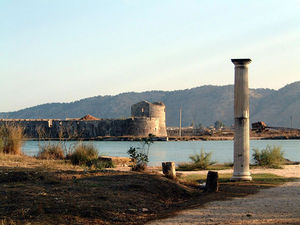
During the early days of his rule he was personally known for his alertness, he soon became a well known Albanian Muslim figure he also commanded one of the largest battalions of Albanian Janissary. Ali Pasha adhered to the Sufi Order of the Bektashi Brotherhood. Ali Pasha was also known to have fasted during the month of Ramadan[6]. Ali's policy as ruler of Ioánnina was mostly governed by expediency; he operated as a semi-independent despot and pragmatically allied himself with whoever offered the most advantage at the time. In fact, it was Ali Pasha and his Albanian soldiers and mercenaries who subdued the independent Souli.[7]
Ali Pasha wanted to establish in the Mediterranean a sea-power which should rival that of the dey of Algiers. In order to gain a seaport on the Albanian coast that was dominated by Venice, Ali formed an alliance with Napoleon I of France who had established François Pouqueville as his general consul in Ioánnina. After the Treaty of Tilsit, where Napoleon granted the Czar his plan to dismantle the Ottoman Empire, Ali switched sides and allied with the United Kingdom of Great Britain and Ireland in 1807, a detailed account of his alliance with the British was written by Sir Richard Church. His actions were permitted by the Ottoman government in Istanbul for a mixture of expediency - it was deemed better to have Ali as a semi-ally than as an enemy - and weakness, as the central government did not have an agenda to oust him at that time.
The poet George Gordon Byron, 6th Baron Byron visited Ali's court in Ioánnina in 1809[8] and recorded the encounter in his work Childe Harold. He evidently had mixed feelings about the despot, noting the splendor of Ali's court and the Greek cultural revival that he had encouraged in Ioánnina, which Byron described as being "superior in wealth, refinement and learning" to any other Greek town. In a letter to his mother, however, Byron deplored Ali's cruelty: "His Highness is a remorseless tyrant, guilty of the most horrible cruelties, very brave, so good a general that they call him the Mahometan Buonaparte ... but as barbarous as he is successful, roasting rebels, etc, etc.."
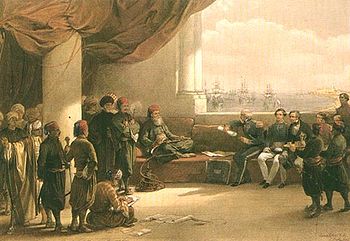
Different tales about his sexual orientation emerged from westerm visitors to Pasha's court (including Byron, the Baron de Vaudoncourt, and Frederick North, Earl of Guildford). These documenters wrote that he kept a large harem of dancing women. Such accounts may reflect the Orientalist imagination of Europe and underplay the historical role of Pasha rather than telling us anything concrete about his sexuality[9].
Ali Pasha, according to one opinion, "was a cruel and faithless tyrant; still he was not a Turk, but an Albanian; he was a rebel against the Sultan (Mahmud II), and he was so far an indirect friend of the Sultan's enemies[10]". Throughout his rule he is known to have maintained close relations and corresponded with famous leaders such as Husein Gradaščević, Mehmet Ali Pasha and Ibrahim Pasha.
Atrocities
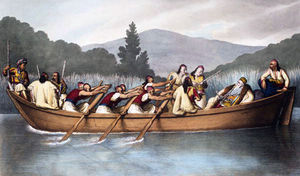
The cruelties inflicted by Ali Pasha on his subjects became notorious throughout the region, and have been described in local folksong and poetry. Forty years after the inhabitants of Gardhiq and Hormova, Albania, had wronged his mother after murdering his father Veli Bey (according to the story, she was tied and put in prison and, with her daughter, raped and tortured every night by another group of men), Ali wrought revenge by having 739 male descendants of the original offenders executed. In 1808, Mühürdar a commanding Janissary of Ali Pasha captured one of his most renowned opponents, the Greek klepht Katsantonis, who was executed in public by having his bones broken with a sledgehammer[11]. One of Ali's notorious crimes, was the massive murder of arbitrarily chosen young Greek girls of Ioannina. They were unfoundly sentenced as adulteresses, tied up in sacks and drowned in Lake Pamvotis.[12] In 1788 Ali Pasha's troops razed the Aromanian metropolis of Moscopole. Oral Aromanian tradition (songs) tells about the cruelty of Ali Pasha's troops.
Αt 1798 Ali's troops attacked the coastal town of Preveza, which was defended by French troops and local Greeks. When the town was finally conquered a major slaughter occurred against the local people as retaliation for their resistance.[13]
Downfall
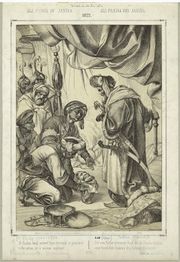
In 1820, Ali allegedly ordered the assassination of Pacho Bey a political opponent and advisor to Mahmud II in Istanbul. Ali Pasha is known to have condemned the dissolution of the Janissary and the The Auspicious Incident. Ali Pasha was a bold and outspoken critic of the Sultan Mahmud II, who sought to restore the totalitarian authority of the Sublime Porte, after decimating the Janissary, Sultan Mahmud II took this opportunity to move against Ali Pasha by ordering his deposition.
Ali Pasha refused to resign his official post, he allied himself with other Pashas in Rumelia and put up a fierce resistance to the Sultan's troop movements, as some 20,000 Turkish troops led by Khurshid Pasha were fighting Ali Pasha's small but formidable army. He lost control of the Souli, and their leader Markos Botsaris began to fight the Ottoman soldiers.
Ali's rebellion against the Sublime Porte increased the value of the Greek military element since their services were sought by the Porte as well. He is said to have contracted the services of the Klephts and Souliots in exile in the Ionian Islands as well as the armatoles under his command[14]. However he feared that the Klephts might rout him before the Ottoman Turks.
After about two years of fighting, in January 1822, however, Ottoman forces had come to Ali Pasha's refuge in the Monastery of St. Panteleimon on the island in Lake Pamvotis, deceived him with offers of a full pardon. When asked to surrender for beheading, he famously proclaimed: "My head ... will not be surrendered like the head of a slave" [15] and kept fighting till the end, but was shot through the floor of his room and his head cut off to be sent to the Sultan. Ali Pasha of Tepelena died on February 5, 1822 at the age of 80. Even though 80 years old man, Ali ranged a three years war against the unpopular Ottoman Sultan Mahmud II.
Khurshid, to whom it was presented on a large dish of silver plate, rose to receive it, bowed three times before it, and respectfully kissed the beard, expressing aloud his wish that he himself might deserve a similar end. To such an extent did the admiration with which Ali's bravery inspired these men efface the memory of his crimes.[15]
Ali Pasha was buried with full honors in a mausoleum next to one of the two main mosques of Ioannina, which still stands. Despite his brutal rule, villagers paid their last respect to Ali: "Never was seen greater mourning than that of the warlike Epirotes."[15]
The former monastery in which Ali Pasha was killed is today a popular tourist attraction. The holes made by the bullets can still be seen, and the monastery has a museum dedicated to him, which includes a number of his personal possessions.[16]
Ali Pasha in literature
In early 19th century, Ali's personal balladeer, Haxhi Shekreti,[17] composed the poem Alipashiad. The poem was written in Greek language, since the author considered it a more prestigious language in which to praise his master.[18] Alipashiad bears the unsual feature to be written from the Muslim point of view of that time.[19]
In the novel The Count of Monte Cristo by Alexandre Dumas, père, Ali Pasha's downfall was brought about by the treachery of Fernand Mondego, an officer in the French Army. Not knowing of the betrayal, Pasha entrusted his wife and daughter to Mondego for safekeeping but he sold them into slavery. Monte Cristo subsequently located the daughter, Haydée, and helped her take revenge on Mondego by testifying in Paris of his betrayal of Ali Pasha.
Ali Pasha is also a major character in the 1854 Mór Jókai 's Hungarian novel "Janicsárok végnapjai" ("The Last Days of the Janissaries") - translated to English by R. Nisbet Bain, 1897, under the title "The Lion of Janina".
Notes
- ↑ http://dergiler.ankara.edu.tr/dergiler/18/24/106.pdf
- ↑ http://www.1911encyclopedia.org/Ali_Pasha
- ↑ Elsie, Fishta; Mathie-Heck Janice (2005). The highland lute: (Lahuta e malcís) : the Albanian national epic. I.B.Tauris. p. 402. ISBN 978-1845111182. http://books.google.com/books?hl=el&id=j7tLgANw8hAC&q=%22ali+pasha%22#v=onepage&q=Lion%20of%20Janina%2C%20was%20born%20of%20a%20Turkish%20family%20from%20Asia%20Minor.%22&f=false. Retrieved 2010-08-26. "Lion of Janina, was born of a Turkish family from Asia Minor."
- ↑ Ahmet Uzun. Ο Αλή Πασάς ο Τεπελενλής και η περιουσία του.. [Ali Pasha from Tepeleni and his fortune] (Greek), p. 3: "Εξαιτίας της μοναδικότητας του ονόματος μιας οικογένειας που μετανάστευσε από την Ανατολία στη Ρούμελη και εγκαταστάθηκε στο Τεπελένι, υπάρχουν ισχυρισμοί που τον θέλουν Τούρκο. Εντούτοις οι ισχυρισμοί αυτοί είναι αβάσιμοι αφού στην πραγματικότητα είναι αποδεδειγμένο ότι καταγόταν από τη νότια Αλβανία."
- ↑ Universiteti Shtetëror i Tiranës, Instituti i Historisë (1987). Studime Historike 41: 140. http://books.google.com/books?id=lJjiAAAAMAAJ&q=Thanas+Vaja+Ali&dq=Thanas+Vaja+Ali&lr=&cd=4. Retrieved 2010-08-17.
- ↑ http://classiclit.about.com/library/bl-etexts/jgalt/bl-jgalt-byron-11.htm
- ↑ Sakeralliu p.250-251
- ↑ ♠Lord Byron's Correspondence - John Murray, Editor.
- ↑ Stephen O. Murray, Will Roscoe, Islamic homosexualities: culture, history, and literature, NYU Press, 1997
- ↑ The Ottoman Power in Europe by Edward Augustus Freeman
- ↑ Merry Bruce. Encyclopedia of modern Greek literature. Greenwood Publishing Group, 2004. ISBN 978-0-313-30813-0, p. 231.
- ↑ Fleming (1999): p. 168.
- ↑ Fleming (1999): p. 99.
- ↑ Brigands with a Cause, by John S. Koliopoulos, p. 40
- ↑ 15.0 15.1 15.2 Ali Pacha: Celebrated Crimes by Alexandre Dumas, père
- ↑ (Greek)Νήσος Ιωαννίνων. (2009). "Μουσεία". http://www.ioannina.gr/DI/tourismos/a3io8eata.htm#mouseio. Retrieved November 12, 2009.
- ↑ J. Ruches, Pyrrhus (1967). Albanian historical folksongs, 1716-1943: a survey of oral epic poetry from southern Albania, with original texts. Argonaut. p. 123. http://books.google.com/books?lr=&cd=2&hl=el&as_brr=0&id=9H9CAAAAIAAJ&dq=inauthor%3A%22Pyrrhus+J.+Ruches%22&q=alipasiad#search_anchor.
- ↑ Tziovas, Dēmētrēs (2003). Greece and the Balkans: identities, perceptions and cultural encounters since the Enlightenment. Ashgate Publishing, Ltd.. p. 5. ISBN 9780754609988. http://books.google.com/books?id=RjGidYC9pUYC&dq=.
- ↑ Merry, Bruce (2004). Encyclopedia of modern Greek literature. Greenwood Publishing Group. p. 12. ISBN 9780313308130. http://books.google.com/books?id=Q-lr20SuvfIC&dq=.
See also
Sources
- Brigands with a Cause, Brigandage and Irredentism in Modern Greece 1821-1912 by John S. Koliopoulos. Clarendon Press, Oxford. 1987. ISBN 0-19-822863-5
- Fleming Katherine Elizabeth. The Muslim Bonaparte: diplomacy and orientalism in Ali Pasha's Greece. Princeton University Press, 1999. ISBN 978-0-691-00194-4.
- "Ali Pasa Tepelenë." Encyclopædia Britannica (2005)
- "Ali Pasha (1744? – 1822)". The Columbia Encyclopedia (2004).
- Rough Guide to Greece, Ellingham et al. (2000)
- Sakellariou, M. V. (1997). Epirus: 4000 Years of Greek History and Civilization. Ekdotike Athenon. ISBN 9602133716. http://books.google.com/books?id=UV1oAAAAMAAJ.
Further reading
- Brøndsted, Peter Oluf, Interviews with Ali Pacha. Edited by Jacob Isager, (Athens, 1998)
- Davenport, The Life of Ali Pasha, (London, 1837)
- Dumas père, Alexandre, Ali Pacha, Celebrated Crimes
- Fauriel, Claude Charles: Die Sulioten und ihre Kriege mit Ali Pascha von Janina, (Breslau, 1834)
- Jóka, Mór: Janicsárok végnapjai, Pest, 1854. (in English: Maurus Jókai: The Lion of Janina, translated by R. Nisbet Bain, 1897).
- Manzour, Ibrahim, Mémoires sur le Grèce et l'Albanie pendant le gouvernement d'ali Pacha, (Paris, 1827)
- Pouqueville, François, Voyage en Morée, à Constantinople, en Albanie, et dans plusieurs autres parties de l'Empire Ottoman (Paris, 1805, 3 vol. in-8°), translated in English, German, Greek, Italian, Swedish, etc. available on line at Gallica
- Pouqueville, François, Travels in Epirus, Albania, Macedonia, and Thessaly (London: Printed for Sir Richard Phillips and Co, 1820), an English denatured and truncated edition available on line
- Pouqueville, François, Voyage en Grèce (Paris, 1820–1822, 5 vol. in-8° ; 20 édit., 1826–1827, 6 vol. in-8°), his capital work
- Pouqueville, François, Histoire de la régénération de la Grèce (Paris, 1824, 4 vol. in-8°), translated in many languages. French original edition available on Google books [1]
- Pouqueville, François, "Notice sur la fin tragique d’Ali-Tébélen" (Paris 1822, in-8°)
- Skiotis, Dennis N., "From Bandit to Pasha: First Steps in the Rise to Power of Ali of Tepelen, 1750-1784", International Journal of Middle East Studies 2:3:219-244 (July, 1971) at JSTOR
|
|||||||||||||||||||||||||||||||||||||||||||||||